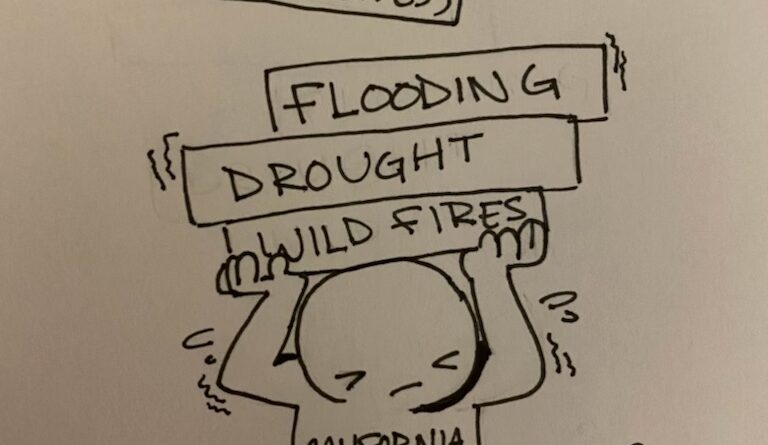California must support unhoused people in face of storms
Thunder and rainstorms struck California over the last month. Streets flooded and collapsed, houses leaked and were destroyed by trees, and people died. Much of this could have been solved by policy change in California legislation.
The Olympian sent out a survey (the Storm Form) to CVHS students and has learned about the impacts on 36 CVHS students so far. Of the students that completed the survey, 33 percent reported that they were impacted by the storms.
In the 2020 to 2021 school year, 1 percent of CVHS students were experiencing homelessness – not accounting for housing instability or unsafe housing. That is around 300 students. Throughout the last three years, the homeless population of California has also increased by over 22,500 people to about 172,000, disproportionately impacting Black and Latine people. Housing is a human right, but our society has made the shelter of housing a privilege to be earned.
During some of the harshest days of the storms, San Francisco ran homeless encampment sweeps–as if experiencing homelessness and a storm isn’t hard enough already.
In Berkeley, activists set up a warming tent for residents of People’s Park who didn’t have other ways of maintaining safety during the storms. The Castro Valley Library also provided shelter for a few days of the storm. Recognizing the humanity and needs of people the systems have cast out is crucial, especially during times of crisis if not all the time. The Olympian believes that when the government isn’t taking necessary action, mutual aid systems are ways citizens can support each other, while still holding the government accountable.
Mutual aid networks, as described by Santa Fe Mutual Aid, are “a network of community volunteers working to support one another, friends, family, & neighbors to meet each other’s basic survival needs at this critical time. It is a system of community to community support & organization for resource sharing, information dissemination, & resilience-building.”
On Jan. 8, Governor Gavin Newsom got an Emergency Declaration approved by the federal government, and proposed $202 million of his budget to “ramp up flood protections.” Meanwhile, Congress approved a specific budget for California water storage. The Olympian acknowledges the importance of water collection for the long-term as we are still in the midst of a severe drought; however, we believe policies to save water should have already been in place and that supporting people should have been prioritized to fight the immediate impacts of the storms.
After observing the destruction of Castro Valley and surrounding areas, Representative Eric Swalwell called for a federal Major Disaster Declaration, to provide California with assistance for infrastructure and individuals. The Olympian believes we should just have better infrastructure and invest in better infrastructure–not just for our schools, but our roads and drainage systems. The Storm Form reported that over 10 percent of students’ ability to get to school or participate in their education was inhibited. On Tuesday, Jan. 17, Redwood High School had to close for in person classes due to a water main break. The Olympian suggests having a distance-learning plan in place in case of worse storms or other issues that may arise in case campus is not a viable option for extended periods of time.
California must support the needs of people through stronger public infrastructure and policies to support marginalized and homeless people as the impacts of the climate crisis further intensify.
If you have been impacted by the storms, or have policy ideas, please fill out the Storm Form.


